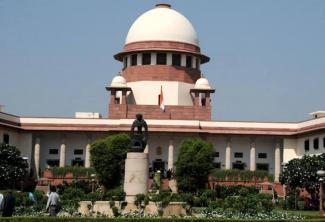
THE Supreme Court response to petitions challenging the Constitutional validity of the Kashmir lockdown and all related issues is an exercise in dishonesty. An editorial in The Hindu called the SC order on internet curbs in Kashmir, “eloquently reticent”. It observed, “If enunciating the law and laying down norms for the exercise of executive power were the only functions of a constitutional court, the Supreme Court’s verdict on the prolonged lockdown in Jammu and Kashmir (J&K) is indeed admirable. However, the apex court is also a court of justice, one duty-bound to enforce fundamental rights. ...When it says Section 144 of the Code of Criminal Procedure ‘cannot be used as a tool to prevent the legitimate expression of opinion or grievance or exercise of any democratic rights’, it makes a comment worthy of being treasured in these times of frequent resort to that section. Yet, the court does not go beyond directing the authorities to review all their orders and restrictions forthwith.”
In a commentary in the Scroll titled “Kashmir judgement: Supreme Court threw down a straw but it was hailed as a lifeline”, Vijay Hiremath and Veena Gowda wrote that “The verdict must be read in the larger context of Kashmir and the court’s response to pleas in other issues related to the revocation of the region’s autonomy.” The writers pointed out that “five months on, the Supreme Court is yet to hear the challenge to the revocation of Articles 370 and 35A. During that time, the state has been split into two Union territories, various human rights institutions have been abolished, dozens of laws repealed and new laws applied. The Court specifically refused an interim stay when the matter was heard before the changes came into effect on October 31. When the Supreme Court finally hears the petitions challenging the constitutional amendments, the exercise may be more academic than practicable, given the far reaching and irreversible nature of the changes that have been brought about on the ground, despite a pending legal challenge.
“In the habeas corpus petitions, after considerable delays, the Supreme Court merely gave orders for some family members and well-wishers to meet the detainees and nothing more than that. Thus, after more than five interminable months, political leaders and lawyers still remain under preventive detention with no date of release mentioned by the authorities.”
The SC accepted two reports submitted by the High Court Juvenile Justice Committee stating that children had not been illegally detained: “This is in stark contrast to many credible reports from the media and other independent quarters based on interviews with families of minors and even some released minors, which reiterate that children were detained, heckled and beaten.”
Meanwhile, a report in the Indian Express has found that “In at least 2 villages of Shopian residents say it has become a regular practice for the Army to call owners of commercial and private vehicles and use their vehicles at night for free. Residents have no idea why and for what purpose are the vehicles used.” What if these cars are being used by some Davinder Singh for a false flag terror operation?
Chief of Defence Staff, General Bipin Rawat has shocked the world by proposing that Kashmiri children be detained in “de-radicalisation camps.” Legal researcher with extensive experience in Kashmir, Shrimoyee Ghosh explained that “General Rawat’s remarks on detention centres for ‘de-radicalisation’ may well be based on the Chinese model, and will make this detention/ ‘re-education’ connection more explicit and systematic, but it develops on a well entrenched system involving police, army and civil authorities. Children and young men are the largest single class of ‘dangerous’ individuals detained (indefinitely) under the draconian Public Safety Act. After PSA detentions, detainees are made to undergo ‘counselling’ or ‘debriefing’ sessions at joint interrogation centres before release. This is all not to say the General’s remarks are not horrifying — he is calling specifically for the internment of children which the PSA at least on paper disallows, and creation of such special camps - but to point out the context and continuities that enable this horror.”
Liberation Archive
- 2001-2010
-
2011-2020
- 2011
- 2012
- 2013
- 2014
- 2015
- 2016
- 2017
- 2018
- 2019
-
2020
- Liberation, JANUARY 2020
-
Liberation, FEBRUARY 2020
- Republic Day 2020: The Republic's Biggest Crisis Has Produced the Most Vibrant Resistance
- Government of the Goons, For the Goons, By the Goons
- Kashmir Caged: SCs Issues Toothless Orders, As Chief of Defence Staff Flaunts Atrocities
- Notes From India's Pro-Democracy Movement
- All India General Strike For Democracy And Workers' Rights
- On Comrade Mahendra Singh's Martyrdom Day: Massive Rally Pledges To Defend the Constitution Against NPR, NRC, CAA
- Save the Constitution Rally in Madhubani
- Samvidhan Bachao Jan Chetana Yatra attacked in Mewar
- Nitish Making Hypocritical Pretense of Environment Protection
- Reign of Terror in Uttar Pradesh
- Young India Marches For Constitution Ahead of Supreme Court Hearing on CAA-NPR-NRC
- Reading 'How Fascism Works' In Modi-ruled India
- Data Dictatorship Disguised as Data 'Protection' Bill
- No to the US War on Iran: CPIML Condemns the Murder of General Qassem Soleimani
- Comrade Sukhdev Prasad
- Comrade Mathura Paswan
- Comrade Lalu Oraon and Comrade Nirmal Mukherjee (Panchu)
- Long Live the Revolutionary legacy of Com. Mujibar Rahman
- Comrade D S Deshpande
- UK Labour MPs Express Deep Concern about CAA
- Liberation, MARCH 2020
- Liberation, APRIL 2020
- Liberation, MAY-JUNE 2020
- Liberation, JULY 2020
- Liberation, AUGUST 2020
- Liberation, SEPTEMBER 2020
- Liberation, OCTOBER 2020
- Liberation, NOVEMBER 2020
- Liberation, DECEMBER 2020
- 2021-2030
Charu Bhawan, U-90, Shakarpur, Delhi 110092
Phone: +91-11-42785864 | Fax:+91-11-42785864 | +91 9717274961
E-mail: info@cpiml.org







